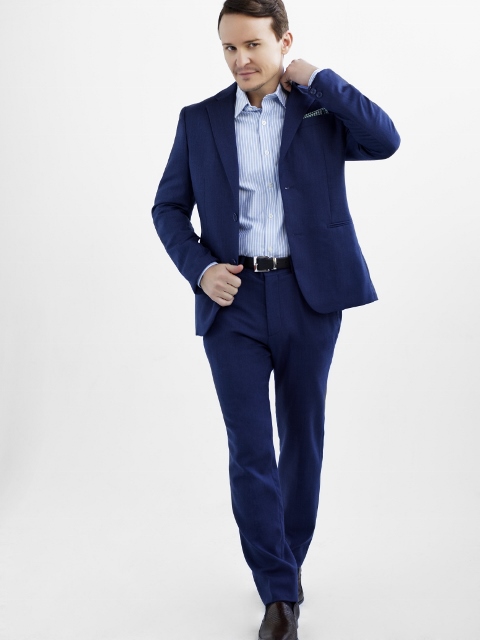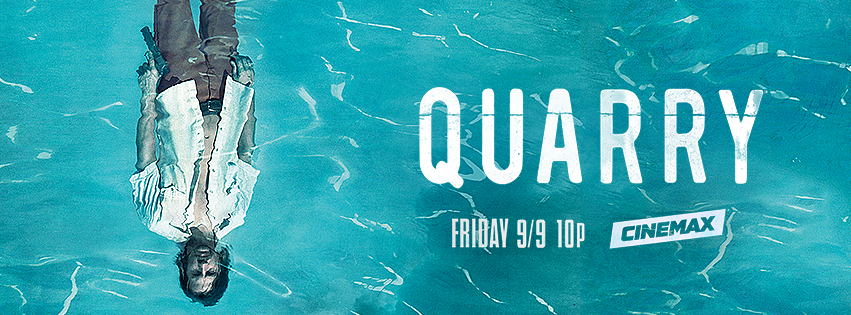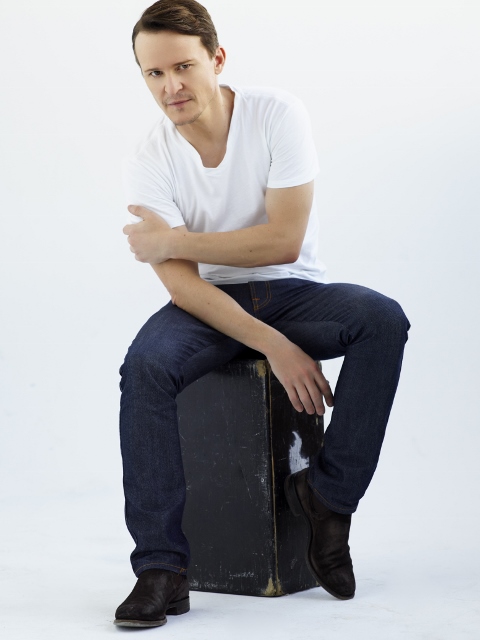
Credit: Rowan Daly
You may recognize actor Damon Herriman from FOX’s Justified, Starz’s Flesh and Bone, and movies including The Lone Ranger and The Water Diviner. Next month, he’ll be applying his considerable talents to the new HBO/Cinemax show Quarry, which is set to debut Sept. 9. We chatted with Damon about his Quarry character Buddy, his passion for playing complex characters, and his upcoming projects. Read on for our interview with Damon Herriman.
You play Buddy in Quarry, which premieres on Cinemax in a couple of weeks. Tell us a little bit about your character, both as a person and in the larger context of the show.
Damon Herriman: In the show, he’s kind of used to introduce the main character of Mac into the world of these underground contract killers. The character of Mac has come back from the Vietnam War, and he gets drawn into this world kind of against his will. Before he knows it, he’s in further than he expected. My character is someone who’s been working for the broker in this particular world for five years. I’m the most experienced of the guys that he’s got working for him, so for the purpose of the show, I show [Mac] the ropes and show him what he’s about to become a part of.
In terms of Buddy the man, he’s such a layered, complex character. He can be incredibly sensitive and quite charming, but he’s also very violent and flies off the handle incredibly easily. Despite having a very tough front, he’s finding life pretty hard at the moment. It’s starting to get to him, the fact that his life pretty much amounts to going out and murdering people. He’s a very layered guy. And he’s gay and living in the South in 1972 – that’s another tough combination.
Did you try to find any common ground between yourself and the character of Buddy? Are there any similarities between you?
I think there are always things that you find in common with a character. Sometimes you find a lot of stuff and you feel like you’re possibly playing a version of yourself. In this case, there’s not really a lot that we have in common. He’s certainly a lot tougher than me, he’s a lot braver than me, he’s a lot more fearless than me. He has a way worse temper than I do. We both like to make the occasional wisecrack, but other than that, there isn’t a lot that we have in common. I like that about him! When there’s a role that’s very different from you, and also one that’s incredibly well-written like this one, that just makes it so much fun.
Quarry is set at a very polarizing time in American history. There was a lot happening politically and socially that informed public opinion about the Vietnam War in a way that had never really happened before. How familiar were you with that time period before you got involved in the show, and did you do any research after you got the role?
I was mildly familiar in that I was a very small child in the ’70s, but I watched documentaries about the ’70s [to prepare]. I even watched a documentary about being gay in the ’70s – there was a specific one about that! And I read stuff that the writers sent me as well. Graham Gordy and Michael Fuller, who wrote the series, had obviously done a ton of research themselves, so they had a lot of stuff they were able to send me to read.

Related to that, Quarry is based on a book series. Did you read the books as part of preparing for the role, or did you prefer to let the script alone inform your idea of the character?
In the end, it was the latter. I did inquire about reading the books, and the writers and the director said there was no harm in doing that, but the books and the series are quite different, especially in terms of the chronology. The books begin with Mac’s character well and truly into his career as a contract killer, whereas the series starts with you finding out how that came to be. Also, the characters do vary a little between the series and the books, so I figured that I would just stick with reading the scripts – and the scripts are so incredibly good. The writer of the books, Max [Allan Collins], did actually write one of the scripts, so he is partly involved as well.
As you mentioned, Buddy is a complex character. You’ve become known for playing some fairly complex characters, including Romeo on the Starz show Flesh and Bone. What’s your favorite part about delving into a multi-layered role like that?
It makes the job so much more interesting. The more complex a character is, there are elements that make it more difficult, but it also makes it easier in the sense that you’ve got more to draw from. A real multi-layered, complex character paints a picture on the page when you’re reading, and that can only help you when you’re coming to work out how this person behaves and thinks and talks and all those things. I really love those types of characters. Certainly in Quarry and Flesh and Bone and the character I played in Justified, Dewey Crowe – [they] were all incredibly well-written characters that were very layered. In all those cases, it made the job a lot more enjoyable for me because of that.
You’re from Australia originally. Is it hard for you to affect the accent of wherever your character is from, or do you get into the role enough that it’s not too tricky to have this whole other voice coming out of your body?
In a way, it just feels like one of the things that’s different from you. You put on clothes that you wouldn’t normally wear, and they might give you a hairstyle that you’d never normally have, and then you end up sounding differently than you normally speak. It’s just one of those other aspects to playing a character. In terms of doing the accents, I think Australians grow up with so much American film and TV that we’re so exposed to that accent [and] it’s usually not that hard to do. You often find kids in Australia who aren’t even actors who do perfect American accents because they’re so used to hearing that.

Credit: Rowan Daly
You’ve worked in film as well as TV. What would you say is the biggest difference between making a movie and shooting a TV show?
Probably time. You usually have a lot more time to work on a particular scene [in a movie]. In a TV show, you can shoot eight, 10, 12 scenes in a day quite easily, and in a movie you are often shooting two or three scenes in a day. It’s the time that’s taken, both in terms of the actual time it takes to shoot a scene … [and] in terms of preparation, rehearsal, all those types of things. And sometimes movies have more resources to draw from because they usually have a better budget for that amount of screen time. A two-hour movie usually has a bigger budget than two hours of television.
It depends whether it’s an indie or a big movie, too. I had a small role in The Lone Ranger, and that was like Disneyland – I’ve never seen so many people and so many trucks and so many sets. They were building whole towns and miles of train track and stuff. That’s obviously a different experience from say, doing a small independent film back in Australia. But it is time that makes the difference – you don’t have to rush as much when you’re shooting a [movie] scene because you’re not normally shooting as many scenes in a day.
Aside from Quarry, what else is coming up for you professionally? Do you have any other projects in the works?
I’m actually currently working on a show in Toronto called Incorporated, which is a science-fiction series that Matt Damon and Ben Affleck are executive-producing. That’s been a lot of fun. And I’m about to go back to Australia and do a play with Rose Byrne [of Damages] at the Sydney Theatre Company. We’re doing the David Mamet play Speed-the-Plow, so I’m really looking forward to that.
Thanks to Damon Herriman for chatting with us! You can follow Damon and Quarry on Facebook, and don’t forget to tune in to Cinemax for the Quarry premiere at 10 p.m. ET/PT on Sept. 9.


Leave a Reply
Your email is safe with us.